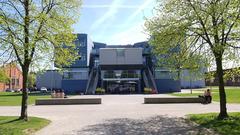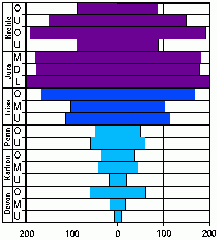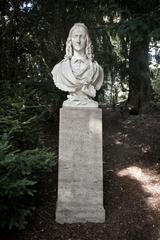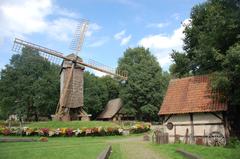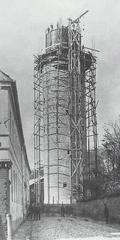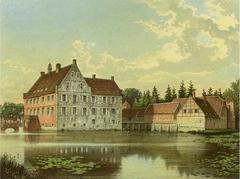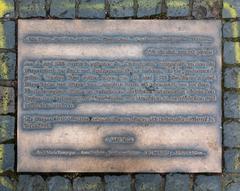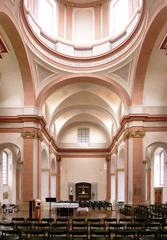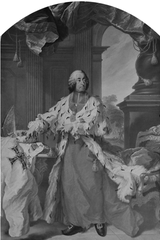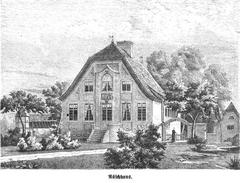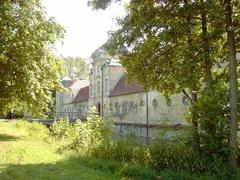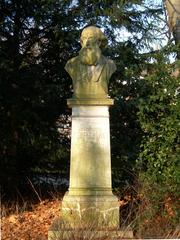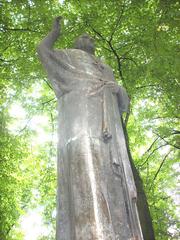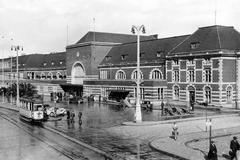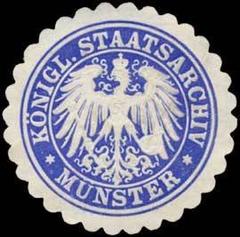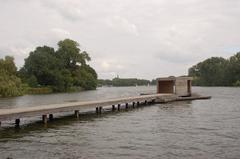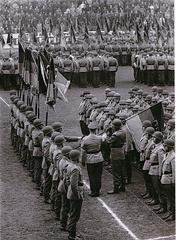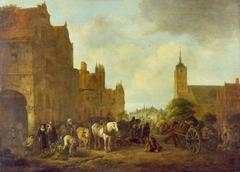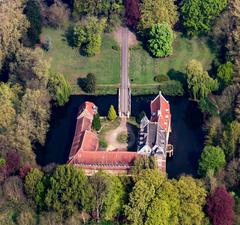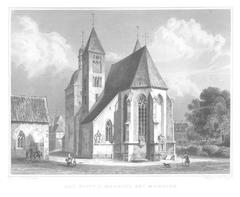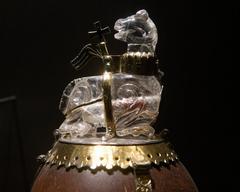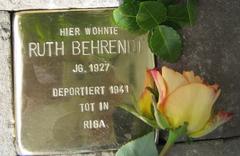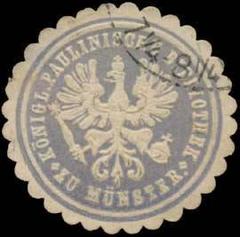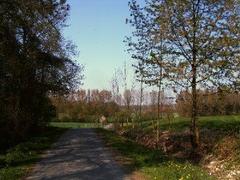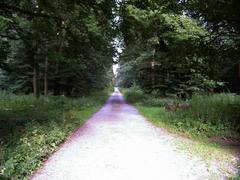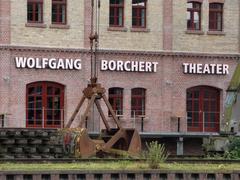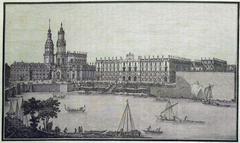
West German Audio Book Library for the Blind Münster: Visiting Hours, Tickets, and Visitor Information
Date: 04/07/2025
Introduction
The West German Audio Book Library for the Blind (Westdeutsche Blindenhörbücherei e. V., WBH) in Münster stands as a pioneering institution dedicated to making literature and information accessible to blind and visually impaired individuals. Established in 1955 within the historic city of Münster, the WBH has grown from a modest post-war project into the largest audio book library for the blind in the German-speaking world, serving as a beacon of innovation, inclusion, and social responsibility (Wikipedia).
Today, the WBH offers an extensive, ever-expanding catalog of professionally narrated audio books and periodicals, state-of-the-art accessibility features, and a wide range of educational and cultural programs. Its fully accessible facilities, located in Münster’s Public Library, welcome both users and visitors interested in the history and future of accessible media. This guide provides detailed information on the WBH’s history, services, visiting hours, accessibility features, and tips for exploring Münster’s rich cultural landscape.
Table of Contents
- Founding and Early Development
- Technological Evolution
- Growth and Collection
- Visiting the WBH: Location, Hours, and Accessibility
- Travel Tips for Visiting Münster
- National and International Significance
- Cultural and Social Impact
- Innovations and Adaptations
- Legacy and Continuing Relevance
- Frequently Asked Questions (FAQ)
- Summary and Visitor Tips
- References
Founding and Early Development
Founded in 1955 in the Public Library of Münster, the WBH was established to address the lack of literary resources for blind and visually impaired people in post-war Germany (Wikipedia). Its earliest audio books were recorded by local theater actors in an improvised studio insulated with egg cartons, often during nighttime hours to avoid urban noise (Wikipedia). This creative and determined approach set the tone for the WBH’s enduring spirit of innovation.
Technological Evolution
The WBH’s evolution mirrors broader advances in audio technology:
- Tape Reels to Cassettes: Initially, audio books were produced on tape reels, later transitioning to compact cassettes in the 1970s, making distribution and use more practical (Wikipedia).
- Digital Revolution: In 2004, the WBH adopted the DAISY (Digital Accessible Information System) Digital Talking Book standard, enabling advanced navigation and bookmarking for users. By 2009, the collection had become fully digital (core.ac.uk).
- Ongoing Innovation: The WBH continues to embrace new formats and technologies, ensuring users have access to the latest and most user-friendly resources (Wikipedia).
Growth and Collection
As of 2025, the WBH houses more than 24,500 titles, from literary classics and mysteries to nonfiction, plays, and contemporary bestsellers (Wikipedia). Each year, around 350 new works are added, recorded by a team of professional freelance speakers in the library’s modern studios.
A unique copyright exemption allows the WBH to record any book published in Germany for free, vastly enriching its collection and enabling comprehensive service to the visually impaired community (Wikipedia).
Visiting the WBH: Location, Hours, and Accessibility
Address:
Westdeutsche Blindenhörbücherei e. V.
Public Library Münster
Alter Steinweg 15
48143 Münster, Germany
- Opening Hours: Monday to Friday, 9:00 AM – 5:00 PM
- Admission: Free
- Guided Tours: Available by appointment in German and English
Accessibility Features:
- Barrier-free entrances and step-free access throughout
- Tactile ground indicators and Braille/tactile signage
- Accessible restrooms and elevators with Braille buttons
- Tactile maps at entrances
- Assistive technologies (screen readers, Braille displays, listening stations)
- Trained staff available for guidance and support (Germany Travel)
Registration is required for borrowing privileges but is free and can be completed in person or online (WBH Official Website).
Travel Tips for Visiting Münster
Münster is renowned for its accessible urban design, vibrant cultural life, and historical sites. The city is easily navigable by public transportation, with tactile paving and audio announcements at major stops. Parking is available in the city center, and bike rental is a popular option.
Nearby Attractions:
- Prinzipalmarkt (historic square with gabled houses)
- St. Paulus Cathedral (Münster Cathedral)
- Münster Botanical Garden
- Picasso Museum
- City Museum
Many nearby sites offer tactile maps and guided tours designed for visually impaired visitors (Germany Travel).
National and International Significance
The WBH serves a nationwide network, providing audio materials to libraries and individuals in western Germany and beyond. Its free lending model and high-quality production standards set a benchmark for accessible library services and have inspired similar initiatives across Europe and internationally (Wikipedia). The WBH also actively participates in the DAISY Consortium and other global accessibility networks.
Cultural and Social Impact
By democratizing access to literature and information, the WBH empowers blind and partially sighted people to participate fully in cultural, educational, and social life. Its programs align with international principles of inclusion and equal opportunity, enhancing quality of life and supporting lifelong learning (core.ac.uk; wecapable.com).
Innovations and Adaptations
The WBH has continually adapted to changing technologies and user needs:
- Transitioned from analog to digital formats
- Adopted DAISY standards for advanced navigation
- Integrated professional speakers for high-quality audio
- Collaborated with advocacy groups and local associations to strengthen outreach and user engagement (dzblesen.de)
Legacy and Continuing Relevance
The WBH’s journey, from its improvised beginnings to its current stature as a leader in accessible media, reflects a broader evolution in attitudes toward disability and inclusion. Its ongoing commitment to innovation, education, and community engagement ensures its relevance in the digital age, inspiring both visitors and professionals in the field (Wikipedia).
Frequently Asked Questions (FAQ)
Q: How do I visit the WBH?
A: The library is open Monday to Friday, 9:00 AM to 5:00 PM. Contact ahead to arrange guided tours or special visits.
Q: Is there a fee to visit or borrow materials?
A: No, admission and borrowing privileges are free, but registration is required for borrowing.
Q: Are guided tours available?
A: Yes, guided tours for individuals or groups can be booked in advance, in German or English.
Q: Is the library accessible for people with disabilities?
A: Yes, the WBH offers comprehensive accessibility features and trained staff support.
Q: Can international visitors access materials?
A: International visitors can use materials on-site or via interlibrary loan, subject to copyright.
Q: What other accessible attractions are nearby?
A: The Prinzipalmarkt, St. Paulus Cathedral, and City Museum are within walking distance and offer accessible facilities.
Summary and Visitor Tips
The West German Audio Book Library for the Blind in Münster exemplifies the fusion of historical commitment, technological progress, and social inclusion. With a vast, professionally produced collection, state-of-the-art accessibility features, and a welcoming environment, the WBH is a model institution for accessible media worldwide. Its integration into Münster’s accessible urban landscape, active community engagement, and international collaborations make it a must-visit for anyone interested in cultural inclusivity and the evolution of library services (core.ac.uk; Wikipedia; Germany Travel; WBH Official Website).
Tips for Visitors:
- Plan your visit during weekday mornings or early afternoons for the best experience.
- Book guided tours in advance, especially for groups or international guests.
- Explore nearby accessible attractions and enjoy Münster’s welcoming cityscape.
- Download the Audiala app for convenient access to audio books and additional resources.
References
- West German Audio Book Library for the Blind: History, Visiting Hours, and Visitor Information in Münster, 2025, Wikipedia
- DAISY Digital Talking Book MP3 standard adoption and technological evolution, 2025, core.ac.uk
- Accessibility and visitor services at WBH, 2025, Germany Travel
- Visiting the West German Audio Book Library for the Blind in Münster: Accessibility, Services, and Visitor Guide, 2025, WBH Official Website

